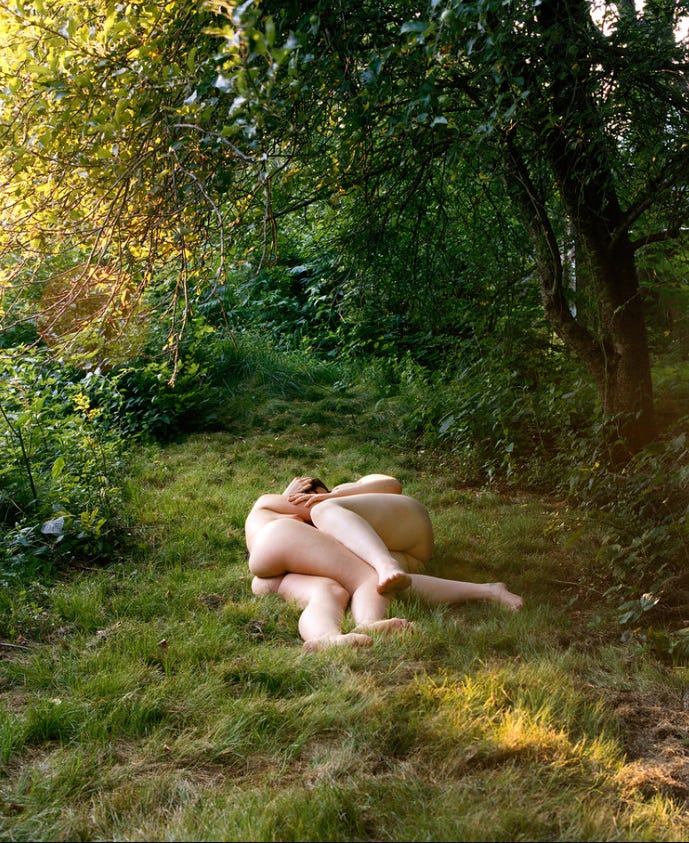Against my better judgment—(could I even locate my better judgment, anymore? Could I ever? This judgment is the one behind the wheel now, texting with one hand at a stoplight, and I’m just her passenger princess, I fear)—I Tweeted About It.
When I tell you that this little gasp of grief—about the latest moment of political theater but also about the utter despair and alienation I have felt for the last nine months re: where a lack of any shared sense of reality has brought us, as a species—has elicited more rage from men on the internet than ANY of my abortion-related writing or tweeting. Many of them note, of course, that I am pro-abortion—joking that what I’m describing here is the abortion clinic where I work. The same old rape and death threats. Lots of “cry about it!” (Joke’s on them, I am obviously already crying about it and will likely continue to cry about it for a very long time).
I should have known better, maybe—though I suffer from the small-Twitter-following disease of assuming a friendly and familiar audience at all times. My tweet found its way to some Very Good Very Hot People (Kehlani please call me, I am normal and can be trusted with access to you) and also to some Very Bad Very Frightening People. All of those people are now flooding my airwaves.
There have been moments, last night and today, when I’ve wished I hadn’t said it. I’ve wished I felt like I had any control over what I say and don’t say, what I do or don’t do. I’ve wished I had control in any sense.
I’ve been doing something lately that I’m not going to talk about here. (Were I a shrewd businesswoman, I would pretend I was going to talk about it, and then put this non-disclosure beneath a paywall once I had tricked you all into clicking through for some secret sexy illicit information. But “shrewd businesswoman” is decidedly not one of the descriptors that has been shouted at me by the anti-abortion protesters on the sidewalk outside the clinic and the men in my work email inbox).
Anyway, this thing has felt sensual and dangerous and delicious and terrifying and is, by all accounts, ill-advised. Not something a girl in control of herself would do, probably. I felt my body gravitating toward it, this choice I’ve made, being pulled to it like I am pulled to: diving headfirst into a strong and unpredictable surf, drinking too much cold white wine and not enough water, running three miles when my ankle already hurts and it’s 85 in the shade, spending money I know I don’t have on a sundress that will make me feel pretty cute for approximately half of an evening with friends before I realize that, actually, this dress is just tight enough as to make me overly aware of my body, in ways that pull focus from the words those friends are saying and the shapes the clouds are making and the taste of the strawberries I have—until this moment—been savoring, present in the juicy sweet wide-open anything-is-possible moment that has, just now, been squeezed to death by some cotton that isn’t stretchy enough and a zipper that will leave a little red mark on the skin stretched over my ribs.
As I write the proposal that I hope will become my next book, I am realizing that so much of the pain in my life—and in the lives of beloveds, patients, strangers, the abortion storytellers and the memoirists and poets I’m so lucky to know—has its gnarled roots deep in the pursuit of self-control.
What does it mean to be out of control? My friends and I are always using words like wild, feral, addicted, unwell, chaotic, unhinged, etc. to describe our own behaviors. I’m a mess, we say. I’m out of control. At what point do we assume those are the neutral baseline?
We are not machines. We are not robots. Our bodies grow and shift and decay, sending out signals of distress and hunger and pleasure as they do. Why, then, should we expect to have control of them?
Why do we quote Mary Oliver’s desperate urging for us to let the soft animal(s) of (our) bodie(s) love what (they) love, back and forth to one another forever, and then go right back to expressing shame and confusion when those bodies do just that?
Here is what I think we should try to control:
— The harm we might do to others
— The tweets we tweet when our Twitter accounts are not private, if we do not wish for people to actually read and engage with those tweets.
— The balance of work and play and rest that will never be perfectly calibrated, but will come close to feeling that way, on some rare summer days when we have childcare and time and our bodies allow.
— That we express the love we feel. Here and now. With urgency. What time is it on the clock of the world? Time to tell that person how loved and how necessary they are, and how much (infinite, no price tag, the limit does not exist) they deserve to love and need in return.
Here is what I do not think we should try to control, and in fact what I think we must stop trying to control if we want to live the rest of our (brief and getting briefer) time on this earth to the greenest richest most abundant most connective most beautiful fullest:
— Our reaction to seeing 186,000 human beings destroyed at the whims of the sorts of men who introduced “control” to us, as a concept of self-abandonment and self-violence that then becomes violence toward and abandonment of others.
— Our curiosity about each other (when we are invited to mind another’s business), and our curiosity about ourselves (when it is best to mind our own)
— How deeply and freely we love. It’s not cringe. It’s not embarrassing. It is literally the only reason for anything ever. Stop that. Let go.
— The sounds our hearts make as they break, no matter who might hear them (just don’t read the comments).








